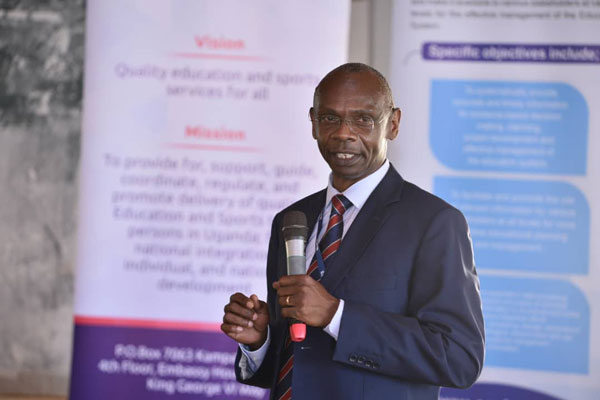
Kampala, Uganda | THE INDEPENDENT | The Ministry of Education and Sports has started providing training to education officers in local governments and selected teachers to help schools effectively utilize the updated Education Management System (EMIS). In July last year, the Education Ministry initiated a program that mandated all schools at every educational level, to enroll in EMIS.
This registration was rolled out for several purposes, including but not limited to establishing a baseline for student verification, aiding in educational planning, and managing assessments. Despite multiple reminders and threats issued through various circulars, many schools failed to complete the registration process. Several issues were identified, including a lack of familiarity with the system among users, as well as challenges related to the availability of computers and internet access.
Vicent Ssozi, the Assistant Commissioner of Statistics, Monitoring, and Evaluation in the Ministry of Education, says to address these challenges, a thorough review was conducted, and the ministry is now taking steps to equip individuals with the necessary skills to effectively manage the system.
Ssozi adds that they have initiated the training with local government officials due to their ability to fulfill multiple roles within the system. After completing their training, these officials will provide support to school headteachers in their respective areas on how to navigate EMIS.
Furthermore, they have specific responsibilities within the system that necessitate a deeper understanding. These responsibilities include approving schools for EMIS numbers, overseeing the registration process, and utilizing the data for administrative purposes, as well as for planning and budgeting purposes.
Patrick Bafunye, the deputy principal of Masulita Vocational Institute, located in Wakiso district, is among those who have received this training. He expresses the opinion that the Ministry should have initiated such training before implementing the system.
According to him, although he faced challenges while working with EMIS in the past, the training has equipped him with the necessary skills, and he now feels confident in using the system effectively.
Bafunye comment echoes a sentiment that has been consistently voiced by headteachers from various regions of the country in previous interviews. This recurring theme suggests that the Ministry made a misstep by implementing the program before adequately training its users on how to operate it effectively.
Meanwhile, in addition to providing training for education officers, Ssozi mentions that the Ministry has taken the initiative to hire 52 permanent EMIS support staff. These support personnel will be assigned to various locations to assist headteachers in utilizing the system.
The assistant commissioner further explains that each of these support staff members will be responsible for assisting at least three local governments.
The existing data reveals that 39,456 education institutions, accounting for 53 percent of the estimated 74,074 institutions spanning from pre-primary to tertiary levels, have uploaded data on their learners.
Among these, a total of 13,545 government schools, constituting 98 percent, have successfully uploaded information about their learners. In contrast, only 25,911 out of the anticipated 60,246 private schools, representing 43 percent, have provided information regarding their learners on the system.
As of August this year, data from the system indicates that a total of 11.5 million learners have been registered. Out of this figure, 10.2 million learners were enrolled by December 2022. Since the beginning of this year, an additional 1.3 million new learners have been introduced into the system, resulting in a cumulative total of 11.5 million learners.
Regarding learners who were registered in the previous year, 6.5 million of them have successfully advanced to the next grade within the EMIS for the current year. This implies that 3.7 million learners are yet to progress to the next grade within the system. When we combine the promoted learners (6.5 million) and the newly added learners for this year (1.3 million), the total number of learners recorded in the system for the year 2023 stands at 7.8 million.
The Ministry acknowledges a challenge where some institutions are failing to promote their learners, underscoring the importance of EMIS officers providing support to these institutions.
Apart from capacity-related challenges, another significant issue affecting schools has been connectivity problems, particularly in areas with poor network coverage. However, Ssozi mentions that a solution is in the works to address this issue.
He explains that the system will be upgraded to function offline, allowing headteachers to input the necessary data into the system without requiring an internet connection. Once they regain access to the internet, the system will automatically update with the data provided offline.
In the same development, Robert Bellarmine Okudi, the commissioner for education planning, has issued a stern warning, stating that starting from October onward, the Ministry will exclusively rely on information from EMIS for planning and budgeting purposes.
He emphasizes that District Education Officers (DEOs) and school headteachers are no longer required to submit primary data, including enrollment figures, on hard copy papers or through emails, as has been the practice in previous budgeting cycles.
The EMIS system comprehensively records data on various aspects, including learners, teachers, instructional materials, and infrastructure. This encompasses information about classrooms, pit latrines, playing fields, land, and other relevant details. The decision to exclusively utilize EMIS data represents a substantial policy shift designed to enhance efficiency and streamline the planning and budgeting processes.
****
URN
 The Independent Uganda: You get the Truth we Pay the Price
The Independent Uganda: You get the Truth we Pay the Price




Am on ground to help schools achieve this goal but we have a lot of things that the ministry should communicate to parents aslso